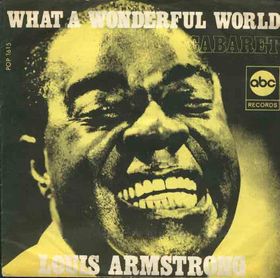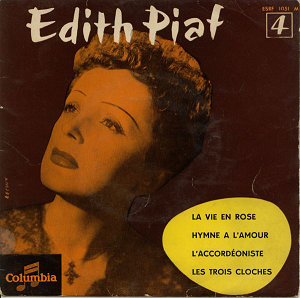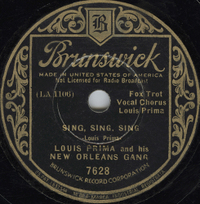
Louis Leo Prima was an American trumpeter, singer, entertainer, and bandleader. While rooted in New Orleans jazz, swing music, and jump blues, Prima touched on various genres throughout his career: he formed a seven-piece New Orleans-style jazz band in the late 1920s, fronted a swing combo in the 1930s and a big band group in the 1940s, helped to popularize jump blues in the late 1940s and early to mid 1950s, and performed frequently as a Vegas lounge act beginning in the 1950s.

The Brian Setzer Orchestra is a swing and jump blues band formed in 1990 by Stray Cats frontman Brian Setzer. In 1998, for their breakout album The Dirty Boogie, the group covered Louis Prima's "Jump, Jive an' Wail", which originally appeared on Prima's 1957 album The Wildest!. The BSO's follow up single, appearing on the album Vavoom!, was "Gettin' in the Mood."
Song of Norway is an operetta written in 1944 by Robert Wright and George Forrest, adapted from the music of Edvard Grieg and the book by Milton Lazarus and Homer Curran. A very loose film adaptation with major changes to both the book and music was released in 1970.
The swing revival, also called retro swing and neo-swing, was a renewed interest in swing music and Lindy Hop dance, beginning around 1989 and reaching a peak from the early/mid to late 1990s. The music was generally rooted in the big bands of the swing era of the 1930s and 1940s, but it was also greatly influenced by rockabilly, boogie-woogie, the jump blues of artists such as Louis Prima and Louis Jordan, and the theatrics of Cab Calloway. Many neo-swing bands practiced contemporary fusions of swing, jazz, and jump blues with rock, punk rock, ska, and ska punk music or had roots in punk, ska, ska punk, and alternative rock music.

"What a Wonderful World" is a song written by Bob Thiele and George David Weiss. It was first recorded by Louis Armstrong and released in 1967 as a single. In April 1968, it topped the pop chart in the United Kingdom, but performed poorly in the United States because Larry Newton, the president of ABC Records, disliked the song and refused to promote it.

"Mambo Italiano" is a popular song written by Bob Merrill in 1954 for the American singer Rosemary Clooney. The song became a hit for Clooney, reaching the Top Ten in record charts in the US and France and No. 1 in the UK Singles Chart early in 1955. The song has shown enduring popularity, with several cover versions and appearances in numerous films.

"That Old Black Magic" is a 1942 popular song written by Harold Arlen (music), with the lyrics by Johnny Mercer. They wrote it for the 1942 film Star Spangled Rhythm, when it was sung by Johnny Johnston and danced by Vera Zorina. The song was nominated for the Academy Award for Best Original Song in 1943 but lost out to "You'll Never Know".

Prima ballerina assoluta is a title awarded to the most notable of female ballet dancers. To be recognised as a prima ballerina assoluta is a rare honour, traditionally reserved only for the most exceptional dancers of their generation. Originally inspired by the Italian ballet masters of the early Romantic ballet, and literally meaning absolute first ballerina, the title was bestowed on a prima ballerina who was considered to be exceptionally talented, above the standard of other leading ballerinas. The title is very rarely used today and recent uses have typically been symbolic, either in recognition of a prestigious international career, or for exceptional service to a particular ballet company. There is no universal procedure for designating who may receive the title, which has led to dispute in the ballet community over who can legitimately claim it. It is usually a ballet company that bestows the title, however some dancers have had the title officially sanctioned by a government or head of state, sometimes for political rather than artistic reasons. Less common is for a dancer to become identified as a prima ballerina assoluta as a result of public and critical opinion.
"Civilization" is an American traditional pop song. It was written by Bob Hilliard and Carl Sigman, published in 1947 and later included in the 1947 Broadway musical Angel in the Wings, sung by Elaine Stritch. The song is sometimes also known as "Bongo, Bongo, Bongo ", from its first line of the chorus. The sheet music gives the title as "Civilization ".

"La Vie en rose" is the signature song of popular French singer Édith Piaf, written in 1945, popularized in 1946, and released as a single in 1947. The song became very popular in the US in 1950, when seven versions reached the Billboard charts. These recordings were made by Tony Martin, Paul Weston, Bing Crosby, Ralph Flanagan, Victor Young, Dean Martin, and Louis Armstrong. Harry James also recorded a version in 1950. Bing Crosby recorded the song again for his 1953 album Le Bing: Song Hits of Paris.

"Sing, Sing, Sing " is a 1936 song, with music and lyrics by Louis Prima, who first recorded it with the New Orleans Gang. Brunswick Records released it on February 28, 1936 on the 78 rpm record format, with "It's Been So Long" as the B-side. The song is strongly identified with the big band and swing eras. Several have performed the piece as an instrumental, including Fletcher Henderson and, most famously, Benny Goodman.
"Just a Gigolo" is a popular song, adapted by Irving Caesar into English in 1929 from the Austrian tango "Schöner Gigolo, armer Gigolo", composed in 1928 in Vienna by Leonello Casucci to lyrics written in 1924 by Julius Brammer.

"Primaballerina" is a 1969 song performed in German by Swedish singer Siw Malmkvist and written by Hans Blum. It was the German entry in the Eurovision Song Contest 1969. Malmkvist was the second of three female Scandinavian schlager artists to represent Germany in the contest in the late 1960s and early 1970s, the first being Norwegian Wenche Myhre in 1968 with "Ein Hoch der Liebe" and the third Danish Gitte Hænning with "Junger Tag" in 1973. Malmkvist had previously also represented her native Sweden in the 1960 contest with "Alla andra får varann".

Anna Hoxha, known professionally as Anna Oxa, is an Italian singer, actress, and television presenter. Oxa has received mainstream popularity and recognition within Italy due to her numerous participations in the Sanremo Music Festival.
"When You're Smiling" is a popular song written by Larry Shay, Mark Fisher and Joe Goodwin. First published in 1928, it bears resemblance to the Spanish Canción "Amapola" by José María Lacalle García. Early popular recordings were by Seger Ellis (1928), Louis Armstrong (1929), and Ted Wallace & His Campus Boys (1930).
"I Wan'na Be Like You (The Monkey Song)" is a song from Walt Disney's 1967 film The Jungle Book. The song was written by songwriters Robert and Richard Sherman, and was performed by singer and musician Louis Prima as King Louie, with Phil Harris providing additional vocals as Baloo the bear.

De-Lite Records, whose formal name was De-Lite Recorded Sound Corporation, was a record label specializing in R&B music from 1969 to 1985; Island Records now manages the De-Lite catalog.
"A Sunday Kind of Love" is a popular song composed by Barbara Belle, Anita Leonard, Stan Rhodes, and Louis Prima and was published in 1946.

"Universal Radio" is a song by German singer Nina Hagen from her third studio album Nina Hagen in Ekstasy (1985). It was released as the lead single from the album in January 1985 by Columbia Records. Written by Ron Dumas and produced by Adam Kidron, "Universal Radio" had modest success on the American charts, peaking at number 39 on the Billboard Hot Dance Club Songs. It was premiered by Rodney Bingenheimer on the radio station KROQ. "Universelles Radio", the German version of the song was also released.

"Cc'è la luna n menzu ô mari" (Sicilian for 'There's the moon amid the sea'), mostly known in the English-speaking world as "C'è la luna mezzo mare", "Luna mezz'o mare" and other similar titles, is a comic Sicilian song with worldwide popularity, traditionally styled as a brisk 6
8 tarantella. The song portrays a mother-daughter "coming of age" exchange consisting of various comic, and sometimes sexual, innuendos. It is frequently performed at Italian-American wedding receptions and other festive occasions. Hit versions have included "Oh! Ma-Ma! (The Butcher Boy)" by Rudy Vallée and "Lazy Mary (Luna Mezzo Mare)" by Lou Monte.












